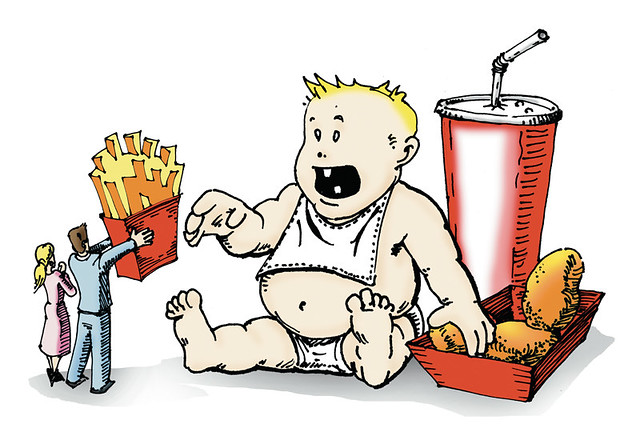If you find 37 minutes time in the next couple of days, I can only recommend that you listen to one of the latest episodes of the Freakonomics podcast, called “100 Ways to Fight Obesity“. It is an episode built out of the recording of a brainstorming session that features some of the most well-known names in the discipline (Kelly Brownell as one of many), as well as behavioral economists, political scientists and other academics that provide input and put new ideas on the table.

Image by Flickr-User Joe_13, via Flickr CC.
They don’t quite get around to all 100 ideas on how to fight (childhood) obesity, but here are some that were floated that I felt were thought-provoking:
On changing public perception of (un)healthy food and obesity:
- Restrict the locations of unhealthy food in grocery stores to particular set-aside areas, similar to the adult entertainment section in video stores
- Run a shocking public health campaign that includes a “list of shame” listing how many people were “killed by Pepsi and Coke”
- Require standardized tests in schools on nutrition and media awareness
- Redefine the debate, centering it around disease terminology (such as “metabolic derangement”) rather than on “fat” or “obesity”. This might on the one hand scare more people into action, and secondly prevent the by-product of anti-obesity campaigns, namely eating disorders, to appear quite as much.
- Introduce caloric monitoring jewellery that changes colors if you eat an oversized meal.
On strong-handed legislation to change the entire setting:
- Abolish sucrose and high-fructose corn syrup.
- Abolish marketing, to anybody for any product, or recreate it so it is “opt-in”-able (so you would be able to be informed without being bombarded with ads wherever you go)
- A little less drastic: eliminate marketing to children as a tax-deductible business expenditure.
Overall, there seemed to be a split between those who advocated for stronger individual action and responsibility and those that attributed most of the responsibility to the environmental and social settings people find themselves in, with – interestingly – the outsiders being much quicker to look for solutions on the individual scale, whereas the nutrition and obesity experts focused much more on system-based changes.
Furthermore, it was interesting to hear the experts’ point of view on how early parental behavior can influence infant and child weights, and when children can understand the concept of obesity and the causal chain that leads there. Definitely worth a listen!
What is your point of view? Is healthy eating rather an individual choice that requires greater self-control or do we need to change the entire environment to successfully combat the obesity crisis?
0 thoughts on “Unorthodox Solutions to Combat Childhood Obesity – the Freakonomics Brainstorm”